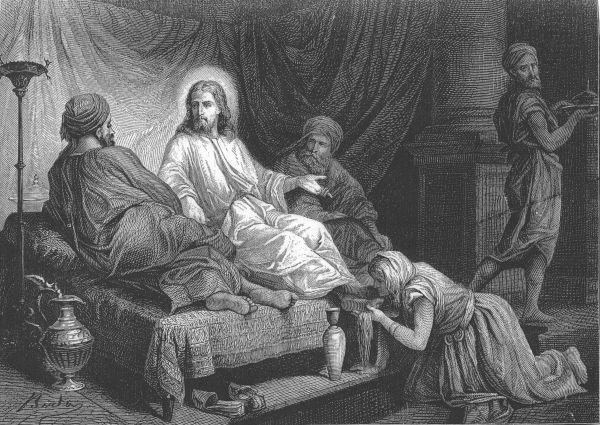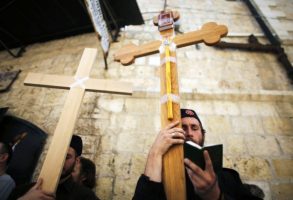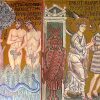An extract from the book Meditations for Holy Week: Dying and Rising with Christ by Archimandrite Vassilios Papavassiliou
The former prodigal suddenly turned chaste, despising the base acts of sin and carnal pleasure, reflecting on the profound shame and the judgment of hell that harlots and wantons suffer. I have become the worst of these and am terrified, yet, fool that I am, I persist in my ugly habit. But the woman taken in sin, troubled and in haste, came crying out to the Redeemer, “O compassionate lover of mankind, free me from the foulness of my deeds.” (Oikos, Matins of Great Wednesday)
“Wherever this gospel is preached in the whole world, what this woman has done will also be told as a memorial to her” (Matt. 26:13). So said our Lord of the penitent harlot who fell before His feet in tears and anointed Him in love. Every Great Wednesday we remember this woman’s repentance, and in so doing, we are reminded of our need to repent:
Though I have outdone the harlot in sin, yet I have offered You no shower of tears. So I fall before You, fervently kissing Your immaculate feet, praying silently that, as Master, You will remit my debts as I cry, O Savior, “Free me from the foulness of my deeds.” (Kontakion, Matins of Great Wednesday)
While the Gospel passage regarding the penitent harlot on Great Wednesday morning is the reading from Matthew 26:6–16, the Church’s hymns on this subject are inspired also by the account in Luke 7:36–50. We find in each narrative two different emphases in the story, which our hymns build upon. The account in Luke’s Gospel reveals to us the greatness of Christ’s mercy. The harlot’s contrition and love alone were sufficient for her salvation. All her sins were washed away in a moment:
Then one of the Pharisees asked Him to eat with him. And He went to the Pharisee’s house, and sat down to eat. And behold, a woman in the city who was a sinner, when she knew that Jesus sat at the table in the Pharisee’s house, brought an alabaster flask of fragrant oil, and stood at His feet behind Him weeping; and she began to wash His feet with her tears, and wiped them with the hair of her head; and she kissed His feet and anointed them with the fragrant oil. Now when the Pharisee who had invited Him saw this, he spoke to himself, saying, “This Man, if He were a prophet, would know who and what manner of woman this is who is touching Him, for she is a sinner.”
And Jesus answered and said to him, “Simon, I have something to say to you.”
So he said, “Teacher, say it.”
“There was a certain creditor who had two debtors. One owed five hundred denarii, and the other fifty. And when they had nothing with which to repay, he freely forgave them both. Tell Me, therefore, which of them will love him more?”
Simon answered and said, “I suppose the one whom he forgave more.”
And He said to him, “You have rightly judged.” Then He turned to the woman and said to Simon, “Do you see this woman? I entered your house; you gave Me no water for My feet, but she has washed My feet with her tears and wiped them with the hair of her head. You gave Me no kiss, but this woman has not ceased to kiss My feet since the time I came in. You did not anoint My head with oil, but this woman has anointed My feet with fragrant oil. Therefore I say to you, her sins, which are many, are forgiven, for she loved much. But to whom little is forgiven, the same loves little.”
Then He said to her, “Your sins are forgiven.”
And those who sat at the table with Him began to say to themselves, “Who is this who even forgives sins?”
Then He said to the woman, “Your faith has saved you. Go in peace.”
This woman’s actions were inspired by love. It may be possible that she spent all she had to acquire the precious ointment. But we read in Matthew that the Apostles—and in John 12:1–6, Judas—murmured that this was a waste of money which could have been used for the poor.
Many others think the same way: Why waste money on splendid churches and religious devotion when there are so many people in need? But throughout its history, the Church has always stressed the importance of both religious devotion and charity. Both are pleasing to God if they are done in a spirit of love. Our Lord acknowledged the harlot’s love for Him in her act of religious devotion. It was also a divinely inspired action, for it was prophetic of His impending burial:
A woman pouring myrrh over Christ’s body anticipated the embalming by Nicodemus. (Synaxarion, Matins of Great Wednesday)
While Luke’s narrative emphasizes the love of the harlot and Christ’s forgiveness, the reading from Matthew emphasizes the contrast between the penitent harlot and the traitor apostle:
And when Jesus was in Bethany at the house of Simon the leper, a woman came to Him having an alabaster flask of very costly fragrant oil, and she poured it on His head as He sat at the table. But when His disciples saw it, they were indignant, saying, “Why this waste? For this fragrant oil might have been sold for much and given to the poor.”
But when Jesus was aware of it, He said to them, “Why do you trouble the woman? For she has done a good work for Me. For you have the poor with you always, but Me you do not have always. For in pouring this fragrant oil on My body, she did it for My burial. Assuredly, I say to you, wherever this gospel is preached in the whole world, what this woman has done will also be told as a memorial to her.”
Then one of the twelve, called Judas Iscariot, went to the chief priests and said, “What are you willing to give me if I deliver Him to you?” And they counted out to him thirty pieces of silver. So from that time he sought opportunity to betray Him.
Our hymns, while praising the repentance of the harlot, at the same time express our bewilderment at the betrayal of Judas, who lived with Christ, ate with Him, witnessed His miracles, heard His words, and even worked miracles in Christ’s name (Matt. 10:1–4):
What was it, O Judas, that turned you into the Savior’s betrayer? Did He separate you from the fellowship of the Apostles? Did He withhold from you His healing grace? Did He banish you from the table when you all supped together? When He washed the feet of the others, did He overlook yours? Oh, how many blessings you have forgotten! And so your ingratitude will be inscribed in history, while His unfathomable forbearance and great mercy will forever be proclaimed. (Kathisma of the sixth antiphon of Great Friday)
As the sinful woman was offering myrrh, the disciple was scheming with lawless men. She rejoiced in pouring out her precious gift; he hastened to sell the precious One. She acknowledged the Master; he departed from Him. She was set free, but Judas was enslaved to the enemy. How terrible his indolence! How great her repentance! O Savior, who suffered for our sakes, grant us her repentance and save us. (Hymn of the Praises, Matins of Great Wednesday)
The hymns of our Church always lay before us the example of penitents who found salvation, revealing the contrast between them and the elect who fell from grace, the proud “insiders” who secretly hated God. The above hymn reminds us of the Communion hymn we often hear at Divine Liturgy (which was initially the Communion hymn only of Great Thursday morning):
Of Your mystical supper, O Son of God, receive me today as a communicant, for I will not tell of the Mystery to Your enemies; I will not give You a kiss, like Judas, but like the Thief I confess You: “Remember me, Lord, in Your Kingdom.”
We are thus reminded that being “insiders” and members of Christ’s Church in no way guarantees our salvation. As our Lord said, after praising the faith of the pagan centurion, “I say to you that many will come from east and west, and sit down with Abraham, Isaac, and Jacob in the kingdom of heaven. But the sons of the kingdom will be cast out into outer darkness” (Matt. 8:11–12).
Thus the Church emphatically warns us that we too can be traitors of Christ, while those we condemn and ostracize may have greater faith, love, and repentance than we do.
The Hymn of Kassiani
The theme of the penitent harlot reaches its climax on Great Tuesday evening with the famous and beloved hymn of St. Kassiani, a Byzantine nun, poet, and hymnographer. Few hymns move Orthodox Christians as much as this adored composition. In the Byzantine tradition, the music for the hymn is slow and sorrowful; it is considered one of the most demanding pieces of Byzantine chant. Cantors take great pride in singing it well, while some Orthodox Christians make a point of going to the service of Great Tuesday evening specifically to listen to this hymn:
Lord, the woman caught up in a multitude of sins, sensing Your divinity, assumes the perfumer’s role; lamenting, she provides myrrh in anticipation of Your burial. “Alas!” she cries, “for me night is a frenzy of excess, dark and moonless, a love affair with sin. You draw from the clouds the waters of the sea; will You accept the fountainhead of my tears? In Your inexpressible condescension You made the heavens incline; incline now to the groaning of my heart. I will cover Your immaculate feet with kisses, then dry them with my tresses. Eve heard Your footsteps in Paradise and hid herself in fear. Who can fathom the magnitude of my transgressions or the depths of Your judgments, O Savior of my soul? Yet in Your boundless mercy do not reject me, Your servant. (The Hymn of St. Kassiani, Doxastikon of Matins of Great Wednesday)
In addition to its poetic and penitential character, this moving hymn provides us with a couple of profound theological references to the Old Testament that place Christ at the beginning of the Creation narrative. This reminds us that Jesus is no mere mortal, but the pre-eternal Son of God “through whom all things were made” (the Nicene Creed):
You draw from the clouds the waters of the sea; will You accept the fountainhead of my tears? In Your inexpressible condescension You made the heavens incline; incline now to the groaning of my heart. . . . Eve heard Your footsteps in Paradise and hid herself in fear.
Such language is typical of Orthodox hymnology, particularly in Holy Week. We are invited to reflect upon the paradox of Christ’s divinity and humanity; His eternity and mortality; His majesty and humility; His almighty power and tender mercy. We fear Him above all others, and we love Him above all others; He is our judgment and our salvation; against Him alone we have sinned, but Him alone we adore. And so, with St. Kassiani and the penitent harlot, we cry: Who can fathom the magnitude of my transgressions or the depths of Your judgments, O Savior of my soul? Yet in Your boundless mercy do not reject me, Your servant.
Meditations for Holy Week is available from Ancient Faith Publishing.




















